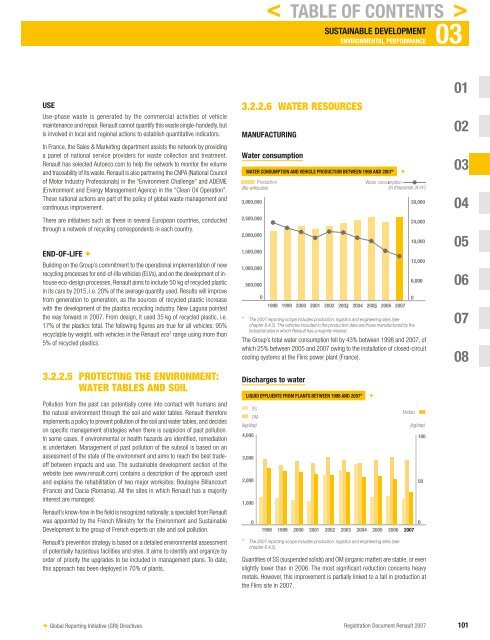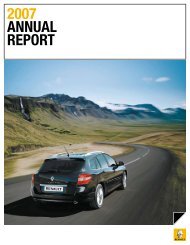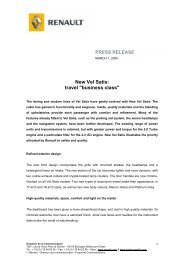2007 Interactive Registration Document - Renault
2007 Interactive Registration Document - Renault
2007 Interactive Registration Document - Renault
You also want an ePaper? Increase the reach of your titles
YUMPU automatically turns print PDFs into web optimized ePapers that Google loves.
USE<br />
Use-phase waste is generated by the commercial activities of vehicle<br />
maintenance and repair. <strong>Renault</strong> cannot quantify this waste single-handedly, but<br />
is involved in local and regional actions to establish quantitative indicators.<br />
In France, the Sales & Marketing department assists the network by providing<br />
a panel of national service providers for waste collection and treatment.<br />
<strong>Renault</strong> has selected Autoeco.com to help the network to monitor the volume<br />
and traceability of its waste. <strong>Renault</strong> is also partnering the CNPA (National Council<br />
of Motor Industry Professionals) in the “Environment Challenge” and ADEME<br />
(Environment and Energy Management Agency) in the “Clean Oil Operation”.<br />
These national actions are part of the policy of global waste management and<br />
continuous improvement.<br />
There are initiatives such as these in several European countries, conducted<br />
through a network of recycling correspondents in each country.<br />
END-OF-LIFE ✦<br />
Building on the Group’s commitment to the operational implementation of new<br />
recycling processes for end-of-life vehicles (ELVs), and on the development of inhouse<br />
eco-design processes, <strong>Renault</strong> aims to include 50 kg of recycled plastic<br />
in its cars by 2015, i.e. 20% of the average quantity used. Results will improve<br />
from generation to generation, as the sources of recycled plastic increase<br />
with the development of the plastics recycling industry. New Laguna pointed<br />
the way forward in <strong>2007</strong>. From design, it used 35 kg of recycled plastic, i.e.<br />
17% of the plastics total. The following fi gures are true for all vehicles: 95%<br />
recyclable by weight, with vehicles in the <strong>Renault</strong> eco2 range using more than<br />
5% of recycled plastics.<br />
3.2.2.5 PROTECTING THE ENVIRONMENT:<br />
WATER TABLES AND SOIL<br />
Pollution from the past can potentially come into contact with humans and<br />
the natural environment through the soil and water tables. <strong>Renault</strong> therefore<br />
implements a policy to prevent pollution of the soil and water tables, and decides<br />
on specifi c management strategies when there is suspicion of past pollution.<br />
In some cases, if environmental or health hazards are identifi ed, remediation<br />
is undertaken. Management of past pollution of the subsoil is based on an<br />
assessment of the state of the environment and aims to reach the best tradeoff<br />
between impacts and use. The sustainable development section of the<br />
website (see www.renault.com) contains a description of the approach used<br />
and explains the rehabilitation of two major worksites: Boulogne Billancourt<br />
(France) and Dacia (Romania). All the sites in which <strong>Renault</strong> has a majority<br />
interest are managed.<br />
<strong>Renault</strong>’s know-how in the fi eld is recognized nationally: a specialist from <strong>Renault</strong><br />
was appointed by the French Ministry for the Environment and Sustainable<br />
Development to the group of French experts on site and soil pollution.<br />
<strong>Renault</strong>’s prevention strategy is based on a detailed environmental assessment<br />
of potentially hazardous facilities and sites. It aims to identify and organize by<br />
order of priority the upgrades to be included in management plans. To date,<br />
this approach has been deployed in 70% of plants.<br />
✦ Global Reporting Initiative (GRI) Directives<br />
< TABLE OF CONTENTS ><br />
3.2.2.6 WATER RESOURCES<br />
MANUFACTURING<br />
Water consumption<br />
SUSTAINABLE DEVELOPMENT 03<br />
ENVIRONMENTAL PERFORMANCE<br />
WATER CONSUMPTION AND VEHICLE PRODUCTION BETWEEN 1998 AND <strong>2007</strong>* ✦<br />
* The <strong>2007</strong> reporting scope includes production, logistics and engineering sites (see<br />
c hapter 8.4.2). The vehicles included in the production data are those manufactured by the<br />
industrial sites in which <strong>Renault</strong> has a majority interest.<br />
6,000<br />
The Group’s total water consumption fell by 43% between 1998 and <strong>2007</strong>, of<br />
which 25% between 2005 and <strong>2007</strong> owing to the installation of closed-circuit<br />
cooling systems at the Flins power plant (France).<br />
Discharges to water<br />
LIQUID EFFLUENTS FROM PLANTS BETWEEN 1998 AND <strong>2007</strong>* ✦<br />
* The <strong>2007</strong> reporting scope includes production, logistics and engineering sites (see<br />
c hapter 8.4.2).<br />
Quantities of SS (suspended solids) and OM (organic matter) are stable, or even<br />
slightly lower than in 2006. The most signifi cant reduction concerns heavy<br />
metals. However, this improvement is partially linked to a fall in production at<br />
the Flins site in <strong>2007</strong>.<br />
01<br />
02<br />
03<br />
04<br />
05<br />
06<br />
07<br />
08<br />
<strong>Registration</strong> <strong>Document</strong> <strong>Renault</strong> <strong>2007</strong> 101




